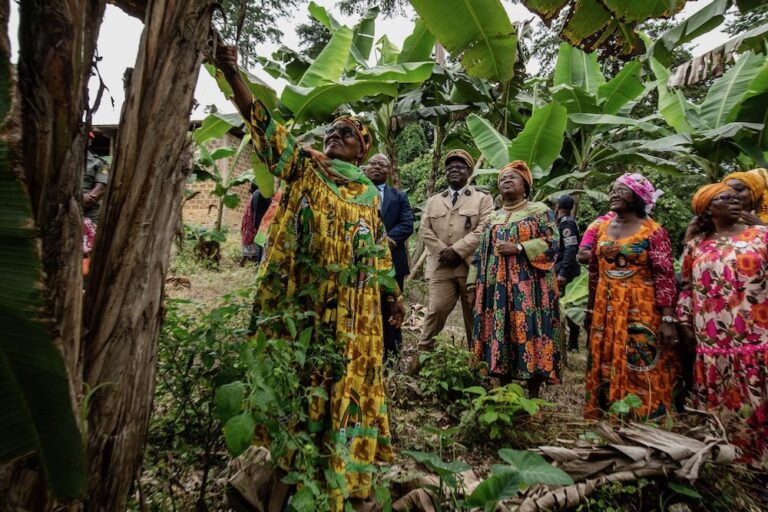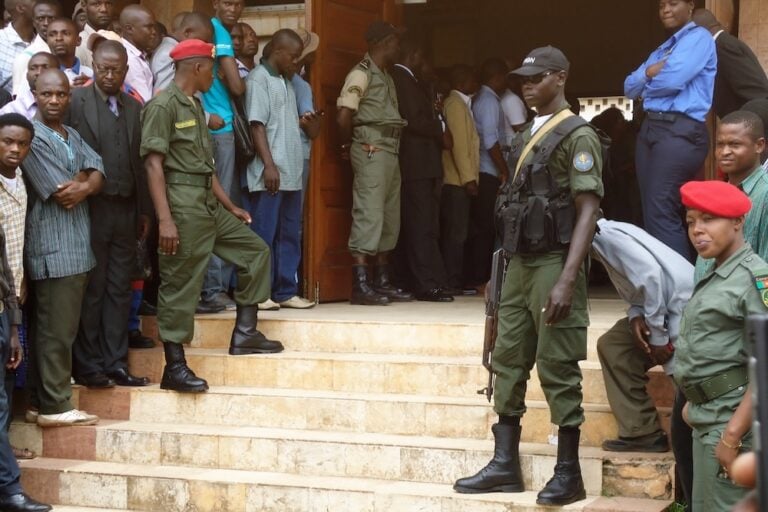CPJ has written to Cameroonian President Paul Biya expressing alarm over a number of recent cases targeting local journalists.
(CPJ/IFEX) – CPJ has written to Cameroonian President Paul Biya expressing alarm over a number of recent cases targeting local journalists:
March 11, 2010
H.E. Paul Biya
President of the Republic of Cameroon
Yaoundé, Cameroon
Via facsimile: (237) 22 20 33 06
Dear President Biya,
We are writing to express our alarm at the harassment and abuse of at least a dozen journalists in Cameroon. These reporters each raised questions about your administration’s management of public finances, the progress of an anti-corruption drive dubbed Operation Sparrowhawk, and local government affairs. We call on you to hold members of the administration accountable for using security forces and criminal laws to settle scores with the media. We further urge you to initiate reforms that would refer matters of defamation to civil courts.
On February 26, police in the capital, Yaoundé, arrested three journalists investigating the state-run National Hydrocarbons Company’s (SNH) purchase in 2008 of the offshore vessel Rio Del Rey, according to local journalists. Editors Harrys Robert Mintya of the weekly Le Devoir, Bibi Ngota of Cameroon Express, and Serge Sabouang of the bimonthly La Nation face charges of “imitating the signature of a member of government,” a criminal offense carrying up to 15 years of imprisonment, according to defense lawyer Jean Marie Nouga. The charges are linked to the journalists’ possession of a government document that allegedly implicates presidential adviser Laurent Esso, who is also the board chairman of SNH, in secret payouts to company managers in connection with the boat’s purchase. Esso has not publicly commented on the allegations.
A few weeks earlier, security agents had interrogated Mintya and Ngota for more than 12 hours and detained Sabouang and reporter Simon Hervé Nko’o from the weekly Bebela incommunicado for a week without charge.
We are outraged by reports that security agents used torture to force Nko’o to reveal his sources. CPJ obtained a copy of a February 22 medical certificate detailing his physical examination after his release. The certificate stated that Nko’o had bruises on the soles of his feet and that he told the doctor security agents had subjected him to waterboarding, sleep deprivation, and exposure to cold. Nko’o went into hiding fearing arrest, according to local journalists. We ask you to order an investigation into these serious allegations.
We are also alarmed by the ongoing harassment of at least eight other journalists who have raised critical questions about the administration’s conduct of Operation Sparrowhawk, an official investigation of former officials accused of mismanaging public funds.
The administration has lodged criminal charges against four leading journalists and an academic for commenting during a June 2008 TV program on the case of Yves Michel Fotso, a former executive at national airline Camair Co accused of embezzlement. Fotso has publicly denied any wrongdoing. A public prosecutor in the commercial capital of Douala charged Spectrum TV Editor-in-Chief Thierry Ngogang, freelance journalist Alex Gustave Azebaze, reporter Anani Rabier Bindzi of Canal 2 International, and Jean-Marc Soboth, a prominent journalist and leading press freedom activist, with “biased commentary” likely to prejudice an active investigation, according to defense lawyer Francis Jackson Ngnie Kamga. A second charge, “unauthorized disclosure of a confidential document,” was based on the journalists’ discussion of a copy of Fotso’s police statements that were leaked to the press. Soboth fled into hiding in January after reporting that he received anonymous death threats, according to local journalists. Also, Lewis Medjo, an editor imprisoned since September 2008, was arrested only a few months after raising questions about the Fotso case, which some journalists speculate may have led to his imprisonment.
In recent weeks, security forces have obstructed two journalists from the leading daily Le Messager from reporting on the cases of former officials indicted in Operation Sparrowhawk, according to CPJ research. On January 17, officers at the State Secretariat for Defense in Yaoundé briefly detained Nadège Christelle Bowa and confiscated her notes from an interview with Thierry Michel Atangana, a former presidential adviser jailed on corruption charges, according to news reports. On February 24, police detained reporter Justin Blaise Akono and forced him to delete courtroom photos during a hearing in the trial of Titus Edzoa, a former presidential adviser accused of embezzlement, the paper reported.
Two other journalists in the northwest town of Bamenda are on trial over an October 2009 story referencing the criminal case of Doh Gah Gwanyin III, a former local official convicted of involvement in the murder of an opposition politician in 2006, according to the Cameroon Association of English-Speaking Journalists. Editor-in-Chief Charly Ndi Chia and Yaoundé Bureau Chief Yerima Kini Nsom of the English-language biweekly The Post are free while battling charges of “libel, blackmail, and abuse,” defense lawyer Dinga Godlove told CPJ.
We believe that arbitrary arrests, criminal prosecutions, and even torture of journalists who raise critical questions about government affairs undermine not only your efforts to root out public corruption, but also confidence in the rule of law and democracy in Cameroon. Access to information is enshrined as a fundamental human right by the United Nations, and upheld by the African Charter on Human and People’s Rights. We therefore call on you to create access to information legislation, and also to ensure that press offenses are referred to civil courts.
Thank for your attention to these very important matters. We look forward to your response.
Sincerely,
Joel Simon
Executive Director


